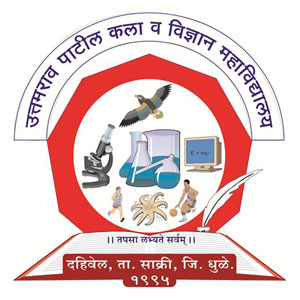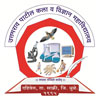
Navoday Shaikshanik Sanstha Dhule’s
Uttamrao Patil Arts and Science College
Near Surat Nagpur Highway, Dahivel,Tal-Sakri, Dhule, Maharashtra – 424304
NAAC Accredited “B” Grade (Cycle I)
Affiliated with KBCNM University, Jalgaon

Navoday Shaikshanik Sanstha Dhule’s
Near Surat Nagpur Highway, Dahivel,Tal-Sakri, Dhule, Maharashtra – 424304
NAAC Accredited “B” Grade (Cycle I)
Affiliated with KBCNM University, Jalgaon

Navoday Shaikshanik Sanstha Dhule’s Uttamrao Patil Arts and Science College is an institute of higher education nestled in the heart of the tribal zone of North Maharashtra. Our distinctiveness lies in our unwavering commitment to:
Higher Education to Marginal Communities: The mission of the institute is “To provide higher education in the faculties of arts and science to the students from tribal and rural sections of the society to groom them to be responsible citizens, who will torch for disseminating knowledge in the tribal and rural masses and sustained socio-economic development of the society with conservation of environment.” The institute is committed to providing higher education to society’s economically and socially weaker sections. Dhule district has a low GER in Maharashtra state; therefore, with the institute’s inception, the objective is to improve the quality of higher education in the catchment area. This institute imparts higher education to rural, tribal and marginalised communities. Uttamrao Patil College enhances the quality of life, developed environment, justifiable living, human values and quality of education. Different expansion activities, including health, literacy, and moral and ethical progress, were introduced under one umbrella to improve the quality of life.
The college has a set of high values and standards for improving community living. The college was established in 1995 to provide higher education for the tribal community who were socially and economically deprived. The college is a pioneer institute, providing higher education to tribal students in the surrounding region. Educational improvement is a stepping stone to economic and social development and the handiest instrument for empowering the tribal. Our mission is to reach out and uplift the students of the hilly tribal region by giving them new directions, heights and ambitions through education. Apart from academic excellence, the college pays sincere attention to students’ physical, moral and cultural development. A rural setup has created a suitable educational environment for physical and mental development.
Research Culture: Teachers’ professional and educational development is always encouraged. The institute has a highly qualified staff, including sixteen Ph. D holders, thirteen research guides, and two NET/SET-qualified teachers. The college has highly qualified teaching staff, with 17 Ph.D. holders and 13 M.Phil. holders. Thirty-two research students are pursuing their Ph.D. under the supervision of faculties that are recognized as PhD mentors. Eighteen students have successfully completed their Ph. D. under the guidance of Dr. B. D. Borse and Dr. S. J. Nnadre. The research committee at our institute supports and inspires faculty members to do research, publish research papers, books of references, monographs, and conferences, seminars, and workshops, among other things. In the past five years, our faculty members have produced over 300 research papers, which demonstrate the strong research culture at our institute. The faculty members of our college are also working on research projects funded by the UGC and parent university.
Cultural Preservation: Our institute is deeply committed to integrating tribal history, language, and traditions into our curriculum and campus life. Most of our students come from tribal communities such as Kokani, Mavachi, Bhil, and Pawara. Our teachers’ knowledge of the languages and culture of tribal students not only helps them to communicate and educate but also fosters a sense of connection and respect. We organise several activities, including the International Day of Indigenous People, the promotion of tribal culture and dance, and research on tribal folk literature and language, to ensure that our students feel connected and respected. Respect for multilingualism in the context of the northern part of Maharashtra, as well as the larger Indian context, needs to be encouraged because it constitutes the great diversity of our country. Uttamrao Patil Arts and Science College strives to teach these values of respect for other languages and cultures, and it is one area where the institution has its benchmark. From the beginning of its journey, our institution has been offering a space suitable for inclusive learning in the form of different language skills, and students are encouraged in this respect through various activities and forums.
Community Engagement: More than just a place of learning, our institute, Uttamrao Patil Arts and Science College, is a vibrant hub for community gatherings, cultural events, and workforce development. We strive to be a part of the community, as demonstrated by the college’s NSS unit’s special camp at a tribal village and our ongoing community engagement activities. Uttamrao Patil Arts and Science College is situated in a multi-ethnic domain and has a distinct advantage for fostering indigenous language and literature. It is enshrined in the long-term vision of the institution to create an ambience of growth and inclusiveness wherein students from various ethnic backgrounds are imparted education, and opportunities are offered to learn and grow.
Indigenous Knowledge: We are committed to incorporating traditional ecological knowledge and tribal epistemologies into our academic programs. The institute values the environmental and cultural understanding of tribal communities—several activities like the natural vegetable festival, preservation of forestation and tribal habitat.
Student-Centeredness: Our institution is dedicated to providing personalised support services, holistic advising, and flexible learning pathways. We prioritize our students’ individual needs and goals, ensuring they receive the support and guidance they need to succeed.
Honouring our legacy as a rural institution by prioritising agriculture, natural resources, and environmental stewardship.
Intertribal Collaboration: We actively foster partnerships with neighbouring tribes and indigenous organisations to amplify our impact. This commitment to collaboration ensures that we are part of a larger community, working together for positive change.
This distinctiveness shapes our mission, academic programs, and campus culture, setting us apart as a unique and vital institution in higher education.

Navoday Shaikshanik Sanstha Dhule’s
Near Surat Nagpur Highway, Dahivel,Tal-Sakri, Dhule, Maharashtra – 424304
© 2022 All Rights Reserved.
Made with ❤ by Sandip Solanki | 93098 68043